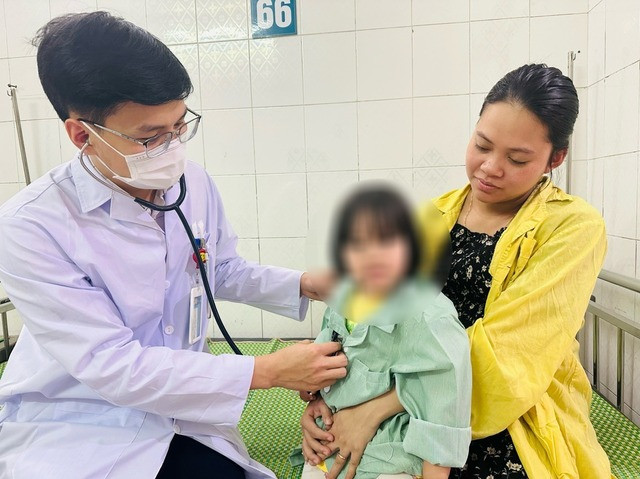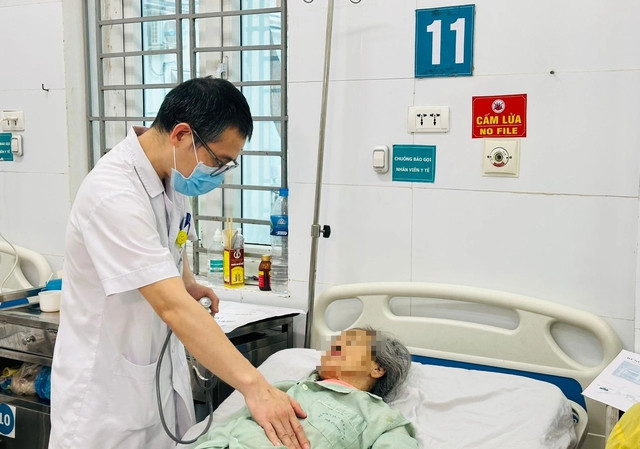Hospitalization of patients with respiratory and dermatological diseases tends to increase in humid weather.

On March 18, Dr. Nguyen Van Quang, Deputy Director of Ha Dong General Hospital, said that the number of patients coming to the hospital for examination and treatment tends to increase in humid weather conditions, especially diseases related to the respiratory system such as flu, pneumonia, bronchitis, etc.
While being examined at the Examination Department, Mr. NXH (in Chuong My, Hanoi) said that he had suffered from chronic obstructive pulmonary disease since 2007, so every time the weather changed, he had difficulty breathing and felt very hot and uncomfortable. This time of changing seasons, the humidity made his symptoms worse. Therefore, Mr. H. was taken to the examination by his family, in case the disease was at risk of getting worse.
In humid weather conditions, children are also susceptible to diseases. While taking care of her 3-year-old daughter who is being treated at the Pediatrics Department, Ha Dong General Hospital, Ms. PT (in Yen Nghia, Ha Dong) said that more than a week ago, the weather changed erratically, her daughter had a high fever and coughed a lot, the family took her to the hospital and the doctors diagnosed her with pneumonia and ordered her to be hospitalized for treatment.
Also having a child hospitalized for pneumonia, Ms. D.TH (in Kim Bai, Thanh Oai, Hanoi) said that her child is very "sensitive" to the weather. Whenever the weather is unusual, the child often gets sick. This time, when the couple saw that the child was not breastfeeding, coughing, had a runny nose, and had difficulty breathing, they took the child to the doctor and were diagnosed with pneumonia.
Experts note that parents need to closely monitor their child's condition. If not treated early, the disease progresses due to the virus, which can cause respiratory failure and pneumonia very quickly.
In addition, the hospital also received many children hospitalized due to diseases caused by humid weather such as allergic rhinitis, rash fever, viral respiratory infections, etc.
Dr. Pham Chien Thang, Deputy Head of the Examination Department, Ha Dong General Hospital, said that the number of patients with respiratory diseases increased by about 20-30% compared to normal days, commonly pneumonia, chronic lung disease, bronchial asthma, bronchiectasis, etc.
According to Dr. Pham Chien Thang, with the increasing number of patients, the hospital has organized examinations and screening. Severe cases will be forced to be hospitalized, while mild cases that do not require hospitalization will be instructed by doctors to be monitored and treated at home, avoiding overload and cross-infection during the current humid weather.
Explaining the reason why respiratory diseases increase in humid weather, Dr. Nguyen Van Giang, Deputy Head of the Department of Respiratory and Lung Diseases, Ha Dong General Hospital said: "Humidity and high humidity are favorable conditions for viruses, bacteria, molds, and parasites to develop. For patients with chronic lung disease, poor health combined with such environmental factors increases the risk of secondary infections as well as stimulates the recurrence of acute lung disease."
Dr. Nguyen Thi Ha Vinh, Deputy Head of the General Planning Department, Central Dermatology Hospital, said that recently, the hospital has recorded many patients with skin fungus (ringworm, pityriasis versicolor); diseases related to allergies, allergic dermatitis due to pollen, irritation due to insects... have also increased with the humid weather. It is estimated that the number of patients coming to the hospital due to these diseases has nearly doubled compared to normal.
For people with atopic dermatitis, humid weather makes the disease worse. Especially in young children who run and jump a lot, sweat in the folds, humidity makes the dermatitis worse, or causes secondary infection with other bacteria and viruses. In particular, because children are not aware, they often scratch, scratch... causing the dermatitis to become more infected.
Some other cases have acne infections, oily skin, sweat, creating conditions for bacteria to grow, clogged hair follicles... the condition gets worse.
Dr. Ha Vinh noted that some parents seek folk remedies such as bathing in salt water, herbal water or water that is too hot, which can affect the skin of young children. In addition, parents also tend to buy drugs of unknown origin, or drugs that are not prescribed properly, causing the disease to not be cured but tend to get worse. When parents take their children to the doctor, it is no longer the initial diagnosis, but maybe 1 or 2 other conditions.
Some parents, when seeing their children have hives, will bathe them in star fruit leaves, dry red dermatitis, eucalyptus leaves, soapberry leaves, and gotu kola leaves...
Dr. Vinh emphasized that these leaves have no effect on the disease because the pathogenesis is not related to treatment with leaves. Leaves may have antiseptic properties, but if used too much, it can dry out the skin and cause loss of the skin's protective lipid layer. In addition, leaves and salt water contain some incorrect ingredients that make the skin condition worse...
Another common mistake is that parents buy topical medications and creams with unknown ingredients, which may contain corticosteroids... which are not suitable for treatment. With traditional medicine, tobacco is similar, which can easily cause atopic dermatitis to discharge more fluid, form thick crusts, where bacteria and viruses can enter after the skin has been damaged. Doctors have encountered cases of atopic dermatitis with other bacterial and viral infections, severe conditions, and long-term treatment... Meanwhile, with uncomplicated atopic dermatitis, doctors can prescribe home treatment. In severe cases with secondary infections, intensive inpatient treatment is required, with oral and topical antibiotics, treatment for 1-2 weeks to improve.
"Chronic skin diseases cannot be completely cured in 1-2 days, so patients need to persistently follow the doctor's treatment regimen," dermatologists recommend.
To prevent diseases in general during the wet season, doctors recommend that people need to have solutions to maintain a clean living environment and improve the body's resistance. It is necessary to maintain a scientific lifestyle: sleep on time and get enough sleep; pay attention to daily exercise to expose to sunlight to improve the body's resistance against pathogens.
Especially for the elderly and children, it is necessary to pay attention to a reasonable, scientific, balanced diet with full of necessary nutrients, micronutrients and vitamins. Eat cooked food and drink boiled water to avoid digestive diseases; minimize eating raw or undercooked food.
When leaving the house, you should wear a mask to prevent illness. Wear enough clothes to adapt to the weather outside. Always carry an umbrella or raincoat when going out to avoid getting cold from the rain.

It is necessary to ensure food hygiene and safety in humid weather; do not eat spoiled or moldy food to avoid infection; keep dishes and chopsticks clean and free of mold.
Use a dehumidifier to create dryness or turn on the air conditioner in dry mode to reduce humidity, maintaining air humidity at 40 - 60% is best. Clothes need to be dried thoroughly to avoid creating conditions for mold to grow.
On the other hand, floors and glass doors are places where water easily accumulates, causing dampness and slipperiness, making it dangerous to move around, so they need to be wiped regularly with a dry cloth. Limit opening doors so that humid air can enter the house.
HA (according to Health and Life)